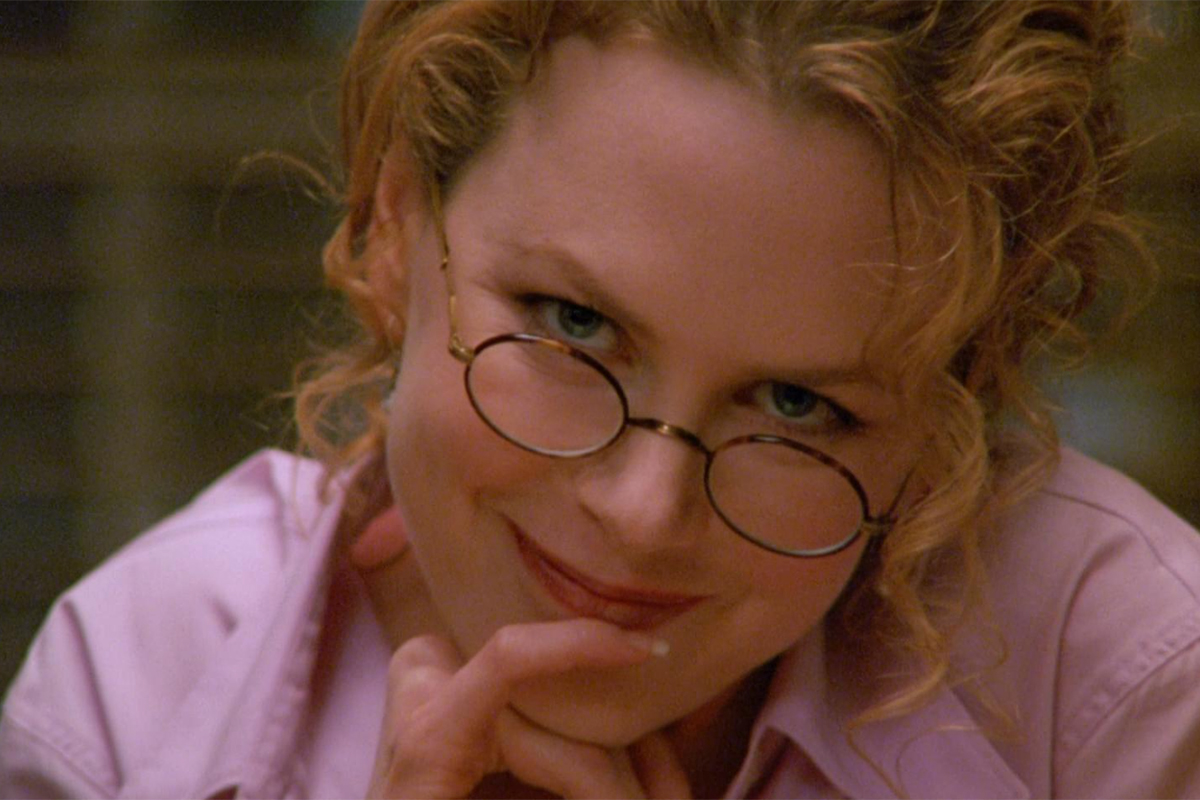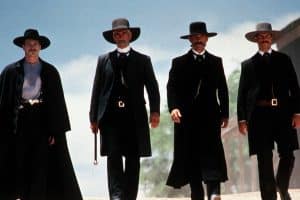There’s one thing the movies have taught us, and it’s that the holidays are much more complicated than Frank Capra would have you believe. Jimmy Stewart makes it look like all you have to do is be a little nicer, and voila! an angel gets its wings. Audiences are more sophisticated than that. Here are ten Christmas movies that aren’t about Christmas but are filled with Christmas spirit.
Enter The Grinch
We’ll start off with one of several Shane Black films: Iron Man 3. Black has a propensity to set his films during Christmas, and the third installment of this Marvel franchise upends the superhero formula by zeroing on the humanity of the protagonist. Yes, Tony Stark is still an egocentric narcissist, but when all of his shiny toys get stripped away, what remains is the man. Much like Ebenezer Scrooge in Charles Dickens‘s A Christmas Carol, Stark is visited by several ghosts, each of which pushes him to examine who he is and what his legacy will be. His heart doesn’t grow two sizes bigger, but he does finally get that life-threatening shrapnel removed, making him whole again.

And speaking of the Marvel Cinematic Universe, what is the Hawkeye limited series but six episodes of Clint Barton trying to save the world and get home to his family in time for the holidays? Well, save New York, at least. And not get killed by hired assassins.
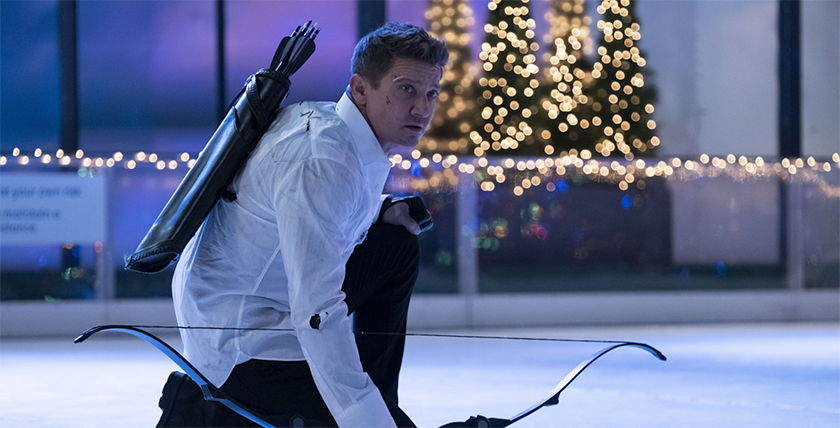
Oh, and it features musical numbers. It’s no Spirited—the Will Ferrell / Ryan Reynolds ode to Very Special Holiday Specials — but slipping a little song and dance into a film is a sure sign that you’re reaching for the heartstrings.
Home for the Holidays
The quest to return home is almost as classic as the death and resurrection motif in narrative fiction. Home is what completes you, after all, because that is where your family is (regardless of how annoying and dysfunctional they are). Someone — somewhere — misses the protagonist, no matter what they’ve done, and if they could only get home in time for supper, then everything will be all right. This desire to rejoin family is the underlying narrative tension in the most classic Not Christmas film on this list: Die Hard.
When it came out in 1988, Die Hard was just another Joel Silver-produced summer blockbuster (in an era when blockbusters were defined by the star power of the headliner and by the number of ridiculous explosions per hour). The biggest buzz about Die Hard before its release was the size of the Bruce Willis’s paycheck — $5 million USD, an unheard of amount at the time for some TV actor best known for a show that was mostly a romantic comedy masquerading as a detective series.

And yet — buoyed by an exceedingly tight script and a star-making turn by Alan Rickman as Hans Gruber, the exceptionally well-dressed thief who demonstrates there is more to villainy than monologuing and having a ridiculous secret base — Die Hard became a cultural touchstone that spawned a million or so imitators. In fact, the United States Library of Congress deemed Die Hard culturally relevant enough to put the film in its National Film Registry a few years ago.
John McClane just wants to see his family for the holidays, for crying out loud. He just has to save a bunch of hostages, stop the bad guys from blowing up a building, and . . . are you starting to see the pattern here?
It’s All About Family
But Die Hard isn’t the first Christmas film with more gunfire and explosions than eggnog and mistletoe. A year before, Lethal Weapon, a slick thriller written by Shane Black (remember him?) and directed by Richard Donner, reimagined the buddy cop film as something deeper, something more heartfelt. Martin Riggs (played with wide-eyed craziness by Mel Gibson) is a loose cannon on the police force, suffering from more than a little PTSD and bereft after the death of his wife. He seems suicidal, but his boss knows that what Riggs really needs is something to ground him, something to give him purpose. He teams him up with Roger Murtaugh (played with mustache-bristling intensity by Danny Glover), an older detective who is a dedicated family man. The rest is car chases, explosions, and a battle royale brawl on a lawn filled with Christmas decorations.
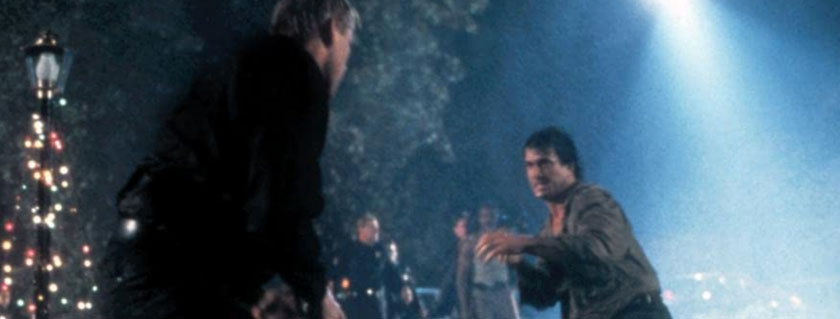
After a few years, of course, plausible story lines got thin on the ground, and Hollywood started relying on star power and able-bodied directors who could shot action films in their sleep. This is how we got Reindeer Games, which was likely pitched as “Die Hard at an Indian casino, but we’ve got John Frankenheimer, the guy who just did Ronin!”
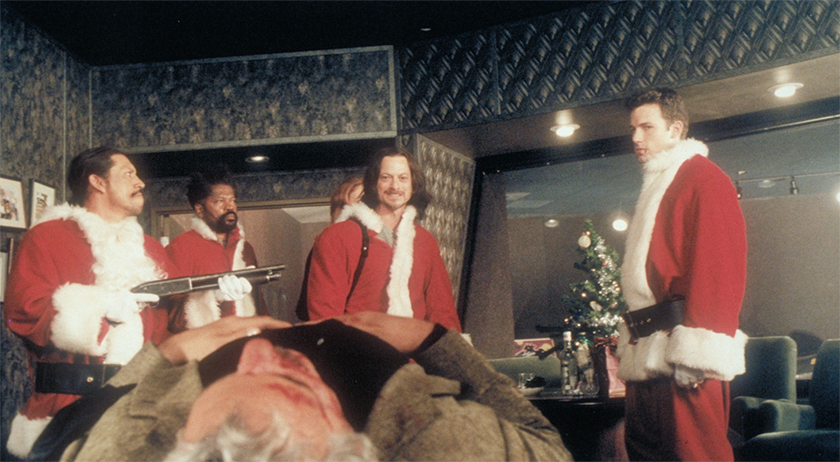
Unfortunately, Ben Affleck is a few years away from being able to convince an audience that he can pull off gritty roles, especially when standing next to folks like Gary Sinise, Clarence Williams III, Dennis Farina, and Danny Trejo. There isn’t much meat in Ehren Kruger‘s script either. Ben’s character is an outsider to this gang of thieves. There’s no connection between him and the others, and they’re not the sort who are looking to adopt an orphan, no matter how adorable he might be.
The Man in the Red Suit
The holiday season has to be more than mere window dressing in your film, however. If you’re going to have a character threatening people while wearing a Santa suit, make sure your audience is going to feel for the guy. Case in point: Louis Winthrope III in Trading Places. John Landis‘s buddy film is a version of Mark Twain‘s classic novel of social inequality The Prince and the Pauper. In Trading Places, two wealthy scions conduct a social experiment around the whole “nature vs. nurture” argument, and they swap an entitled commodities broker (played with goofy affability by Dan Ackroyd) with a destitute street hustler (a fiery Eddie Murphy in his second big-screen role). Naturally, things go awry for the schemers when the subjects of their experiment realize what is going on, but not before Ackroyd’s Winthrope hits rock bottom.
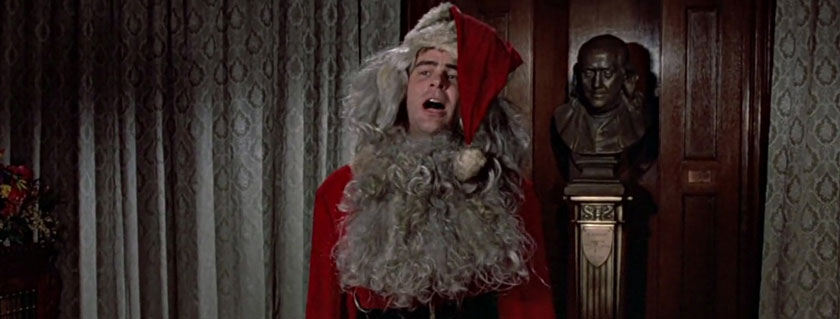
The Dark Side
The nights are long at Christmas, and people get into all sorts of things in the dark. In Eyes Wide Shut, Stanley Kubrick‘s classic tale of obsession and secrets, a successful but unsatisfied doctor embarks on a night-long journey of self-discovery. As he wanders through a holiday landscape suffused with all manner of soft-focus Christmas lighting, he finds out what folks do behind closed doors during the holiday season. Billed as an “erotic thriller,” Eyes Wide Shut is the last film Kubrick completed before he died, and like all his films, every frame is carefully composed and constructed by the director. Sure, it’s a movie about infidelity and objects of desire, but when wrapped up in Christmas finery, the film becomes hauntingly obtuse. What we want, as an audience, is always just out of reach.

Imagine George Bailey’s guardian angel in It’s a Wonderful Life always teasing George on, never telling him the point of all these flashbacks of his life. “Figure it out, George. This is your life after all. You expect me to give you the answers in a neat and tidy package?”
What’s in the Box?
And speaking of tidy packages, it’s alway the cute ones that cause the most trouble. In Gremlins, young Billy Peltzer (played by Zach Galligan) is given an adorable gift by his father. “But remember,” his father says, “there are rules and responsibilities that come with such gifts.” Naturally, Billy screws up the rules, dozens of monsters are spawned, and lots of people die.
This is why we can’t have nice things at Christmas, by the way.
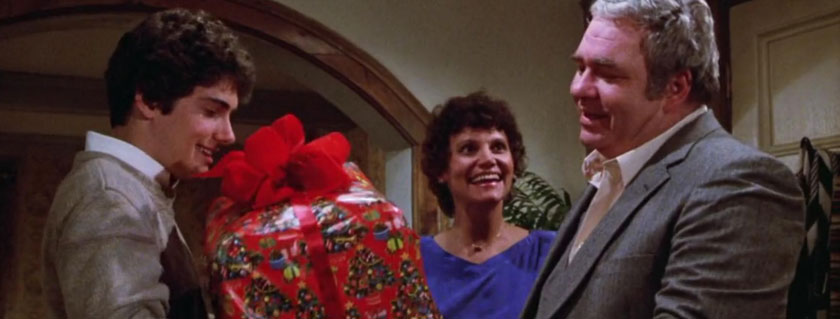
While we think of Gremlins as more of a dark comedy these days, when it was released in the summer of 1984, it wasn’t quite violent enough for an R rating. But it was violent enough that the Motion Picture Association drafted a new ratings recommendation: PG-13. There’s documentation somewhere that clarifies the exact amount of blood you can show on-screen before a film gets red-banded.
Anyway, notwithstanding the heartbreaking backstory of why Kate Beringer (played by Phoebe Cates) dislikes Christmas, the underlying moral of this animatronic monster fest is a stern-fingered warning about hubris and consumer consumption. The gremlins have a voracious appetite, and scenes of them marauding through the sleepy town of Kingston Falls play out like a Black Friday shopping frenzy.
Snow Is Just Frozen Tears
It doesn’t take much to turn a group of earnest carolers into a horde of outraged citizens. Even the most innocent of souls can find themselves on the wrong side of the neighborhood, and there is nothing more isolating than being cast out and forced to spend the holidays alone, in a dark castle, pining for your love.

Tim Burton could have easily set Edward Scissorhands during the summer. After all, Edward is good at cutting hair and making topiaries, which are very much summer sort of activities. But it is the image of Edward (Johnny’s Depp‘s first starring role, by the way), cutting ice sculptures and making it snow, that is the magical image that audience remember. The miracle of Christmas, as it were, offered up by an ageless being who wants nothing more than to be loved and accepted, but who is cast out by fanatics for being different.
Cocktail Hour
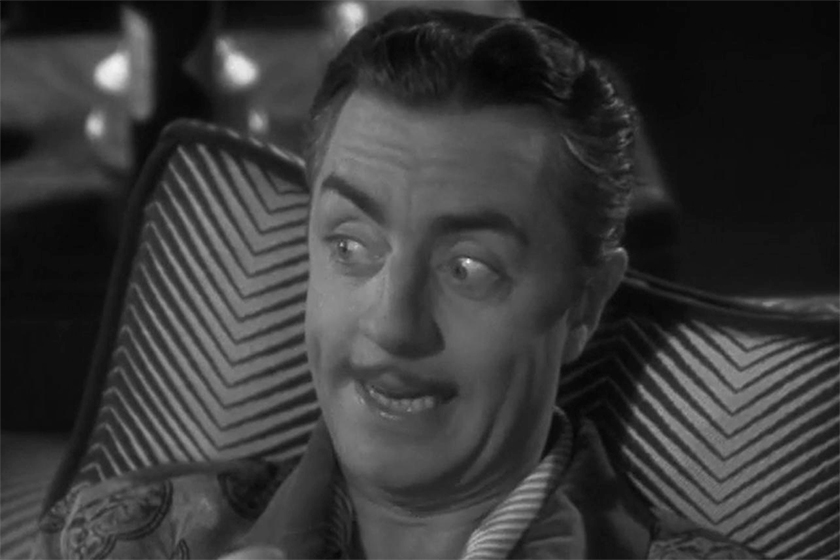
And finally, here’s the classic screwball comedy/murder mystery that introduces the world to the well-heeled and perpetually tipsy couple of Nick and Nora Charles. Played with impeccable timing by William Powell and Myrna Loy, The Thin Man is a pre-code American film based on the novel by Dashiell Hammett. The interplay between Powell and Loy prefigures the rapid-patter banter of the entire buddy film genre, and the classic “invite all the suspects to a dinner party whereupon the murderer will be revealed” plot is straight out of an Agatha Christie novel. (In fact, you could argue that The Thin Man is merely Hammett putting an American spin on the Christie model, which is to say: adding more bodies and more booze.) The Thin Man turns the classic holiday dinner into mystery theater, which is not a bad way to elevate awkward family dinners.
As you gather the clan and argue about what to watch as a family, consider something a little unorthodox this year. Sure, someone will argue these are “Christmas” movies, but that’ll just spur the post-viewing conversation, won’t it? And maybe everyone will learn something new about themselves this year.
Cover image: Nicole Kidman in Stanley Kubrick’s Eyes Wide Shut. (Image via Warner Bros.)
Looking for some music for your projects? At Videvo, our library has everything from free ambient music to music for streams — perfect for any indie project:
- Royalty-free Christmas music
- Royalty-free meditation music
- Royalty-free upbeat music
- Royalty-free jazz music
- Royalty-free Halloween music
Need a break? Check out our videvoscapes — the ultimate reels for relaxation or concentration. Each videvoscape collects hours of high-definition nature footage and background video with downtempo chill beats for the ultimate escape from the grind.
